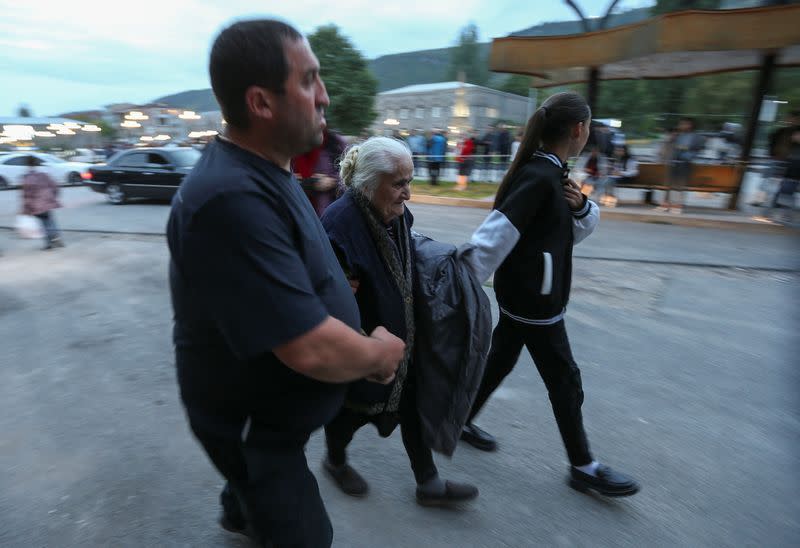Fleeing bombs and death, Karabakh Armenians recount visceral fear and hunger
By Felix Light
GORIS, Armenia (Reuters) - After the village was bombed so hard there was no way to bury the truckloads of dead, he fled with his family and stuffed whatever possessions could be salvaged into two vans.
Petya Grigoryan is one of the first ethnic Armenians of Nagorno-Karabakh to make it to Armenia after a lightning 24-hour Azerbaijani military operation defeated the Karabakh Armenian forces.
The ethnic Armenians of Karabakh, internationally recognised as part of Azerbaijan, say they will not live as part of Azerbaijan and that almost all of the 120,000 Armenians there will leave for Armenia.
So far several hundred have reached Armenia.
Grigoryan, a 69-year-old driver, said his Kochoghot village in what the Armenians know as the Martakert district of Karabakh was pummelled by Azerbaijan armed forces. There were two KAMAZ-truckloads full of civilian dead in the village, he said.
"There was nowhere to bury them," Grigoryan told Reuters after making his way down the Lachin corridor and across the border into Armenia, where Reuters interviewed him and other refugees in the border town of Goris.
"We took what we could and left. We don’t know where we’re going. We have nowhere to go," he said.
Of the 500 villagers, he said 40 had got out.
Reuters was unable to independently verify his account but it chimed with the outline given by other ethnic Armenians fleeing Karabakh, which Azerbaijan says will be turned into a "paradise" and fully integrated.
Azerbaijan said it launched the operation against Karabakh forces after attacks on its own citizens. President Ilham Aliyev said his army had only targeted Karabakh fighters and that civilians had been protected.
STRICT ORDER
"Before the operation, I once again gave a strict order to all our military units that the Armenian population living in the Karabakh region should not be affected by the anti-terrorist measures and that the civilian population be protected," he said in an address to the nation on Sept. 20.
"Civilians felt protected entirely thanks to the professionalism of our armed forces," he said.
Grigoryan and thousands of other Armenians made their way to the airport near the Karabakh capital, known as Stepanakert by Armenians and Khankendi by Azerbaijan, where some Russian peacekeepers are based.
"It was scary there," he said. Thousands slept on the ground without food and little water. "There was nothing to eat or drink; three days without food," he said.
Nairy, a builder from Leninakan, Armenia, said he had been trapped in Karabakh since December by the blockade. Then the Azerbaijan military shelled the Shosh village where he was staying.
"The kids were injured. We sat in the basements until the peacekeepers came in and took the people out," he said.
He too had made his way to the airport.
"We are extremely grateful to the lads for sharing their rations with the kids," he said. "The Russian peacekeepers went hungry to give the kids their rations."
At the airport, he said, there were thousands sleeping outside.
(Writing by Guy Faulconbridge; Editing by David Holmes)



